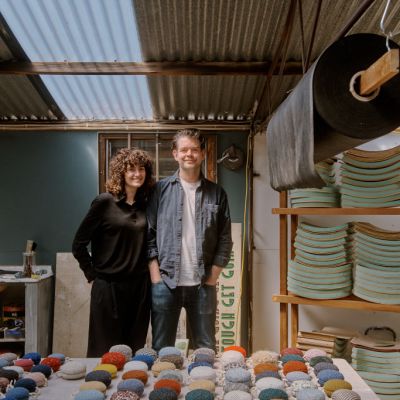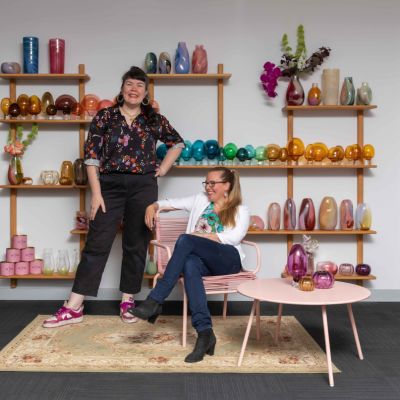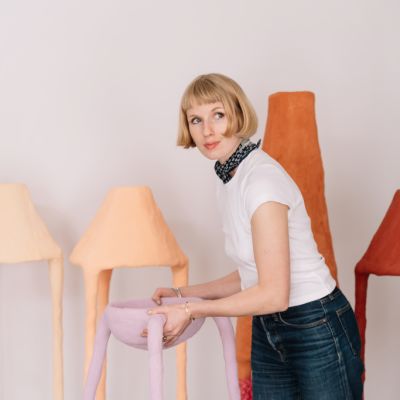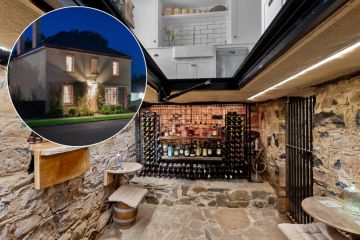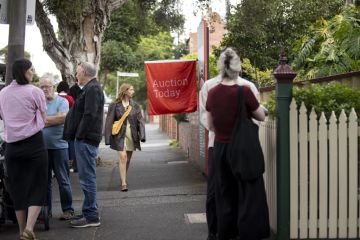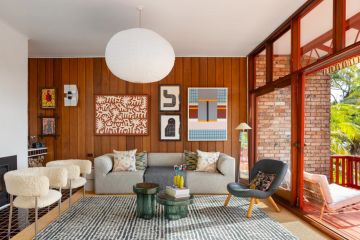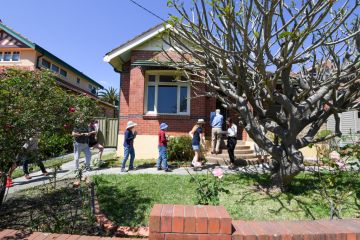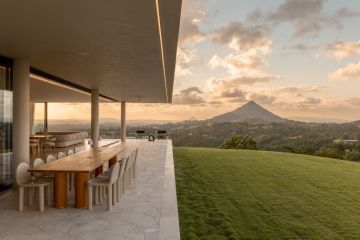The butterfly effect: Marisa Mu is making big waves in the art world
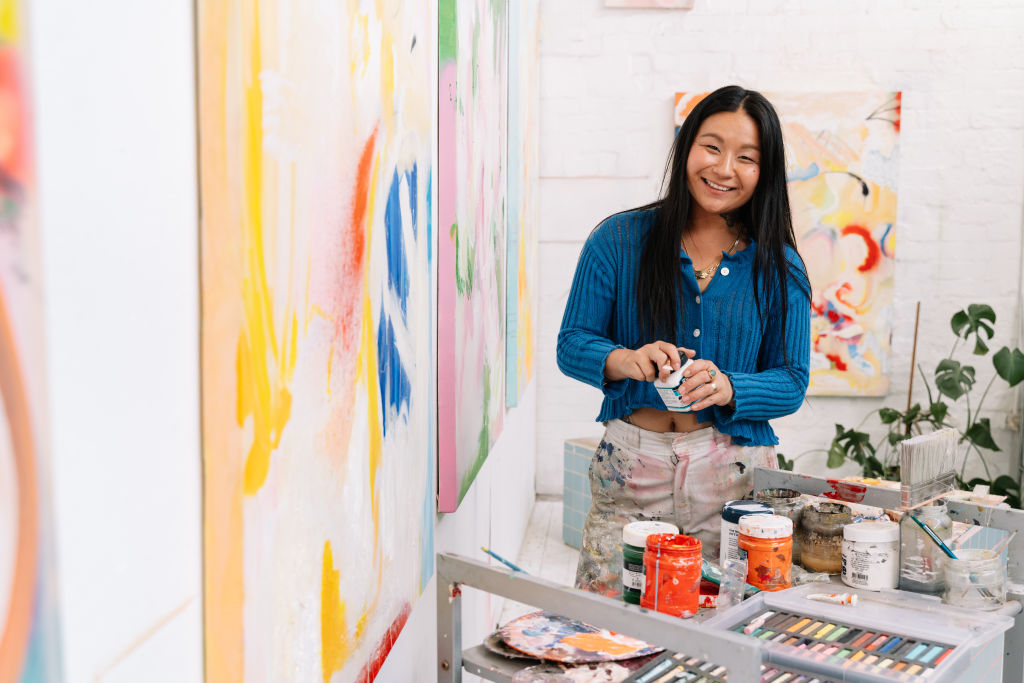
Marisa Mu sits on the kerb outside her studio in Fitzroy. She wears her mother’s jade ring and has a bold butterfly tattoo on her neck. Both are deeply significant. Mu is an artist who plays close attention to signs. The fact that I share a first name with her mother, Jenny, is a good sign, she’s sure.
Thirteen years ago, at her mother’s funeral, Mu was circled by the biggest butterfly she’d ever seen.
“Since then, whenever I’ve had an epiphany, I’ll see a butterfly circling me,” Mu tells Broadsheet. “It got to the point where I felt like I was okay to make a statement with the tattoo. The reason I am a painter is foremost because my mum was an artist.”
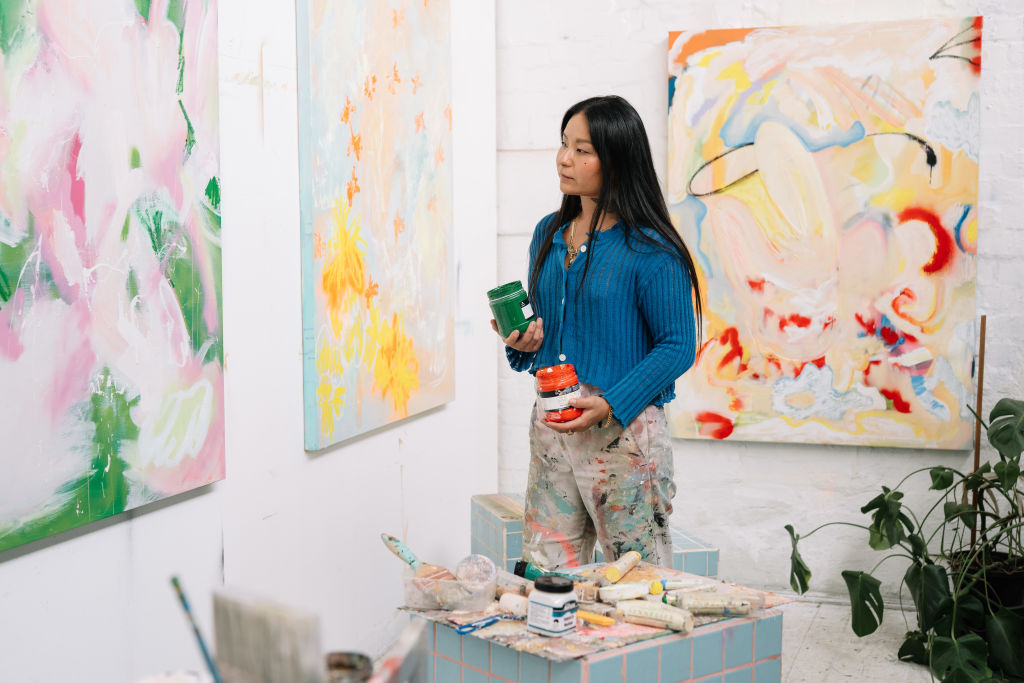
While Mu has long struggled with imposter syndrome, her CV tells a different story. It’s packed with accolades, not least the Fortyfivedownstairs Emerging Artist Award she won in 2019 with one of her famed Femme Figures paintings. They’re miniatures of queer femmes and women of colour, whose dancing bodies, viewed from a distance, create a flowing shape to remind us of our interconnectedness. Themes of pleasure, self-love, freedom and movement run rampant across all her work.
Mu’s biggest muses were her mother and two aunts, who all died within three years of each other. In this tragedy there is embedded a life’s mission.
“They were so strong, so resilient and they cared so much about community,” Mu says. “I thought, ‘Why are these powerhouse women dying when they should be the ones leading us?’ In Chinese culture, life is cyclical. Art is a language and I want to say what they couldn’t.”
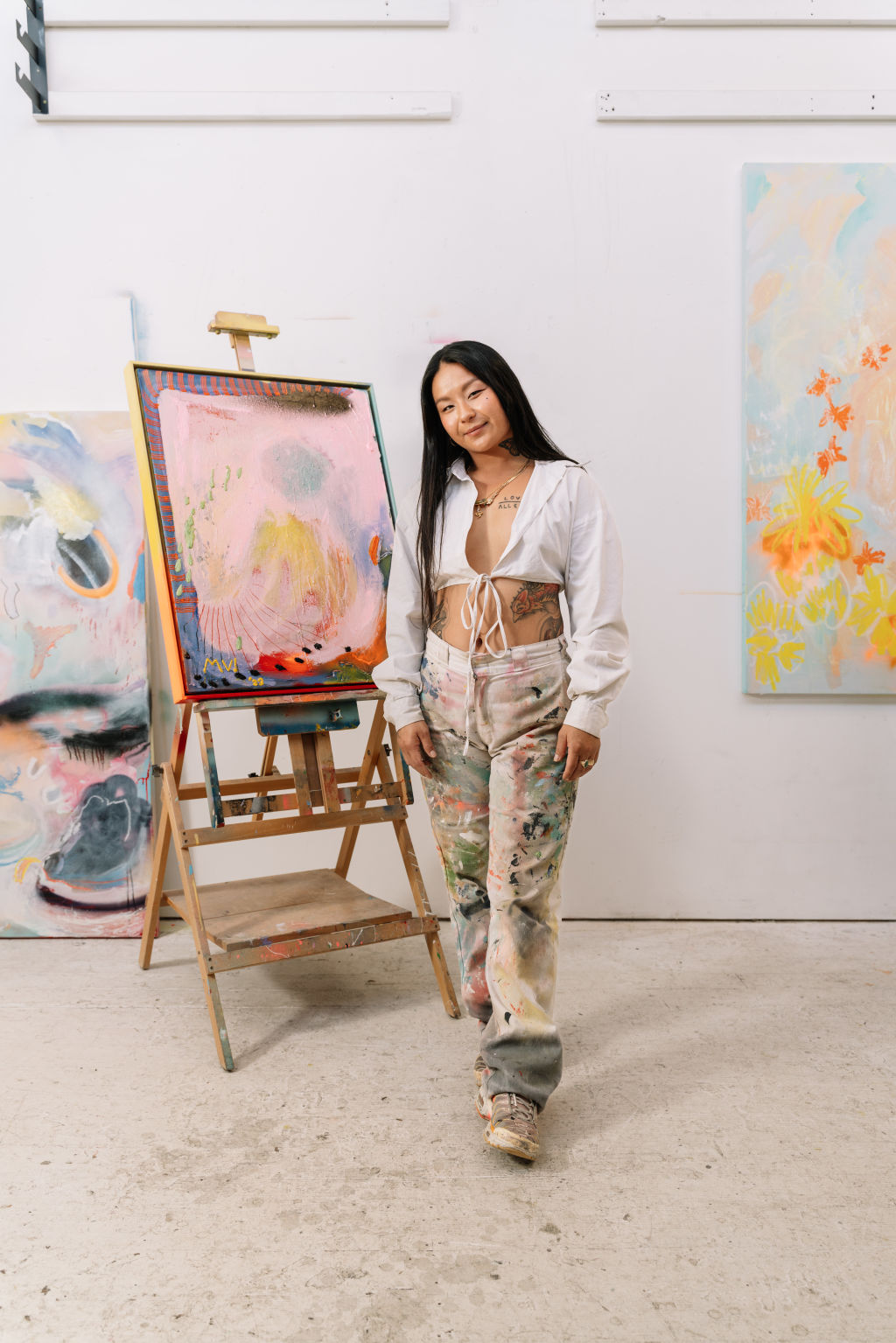
Mu’s parents escaped the Indonesian invasion of East Timor in the 1970s by moving to Sydney’s western suburbs, unable to speak English. Jenny was a self-taught oil painter who also did floristry, so she’d set up her own floral still-life scenes. “Those were my fondest memories of her when I was little person,” Mu says. “It greatly impacted me when she passed away. I was crippled by the concept of painting because I had this debilitating narrative which was, well, what’s the point?”
Mu was 19. She enrolled at Sydney’s College of Fine Arts (now UNSW Art & Design) to do a bachelor of design, and in 2014 founded the Marisa Mu Design studio, producing printed leather bags while working in retail management to make ends meet. She quashed her desires to be a painter until she was invited to do a design show and decided to challenge herself by making an additional series of paintings.
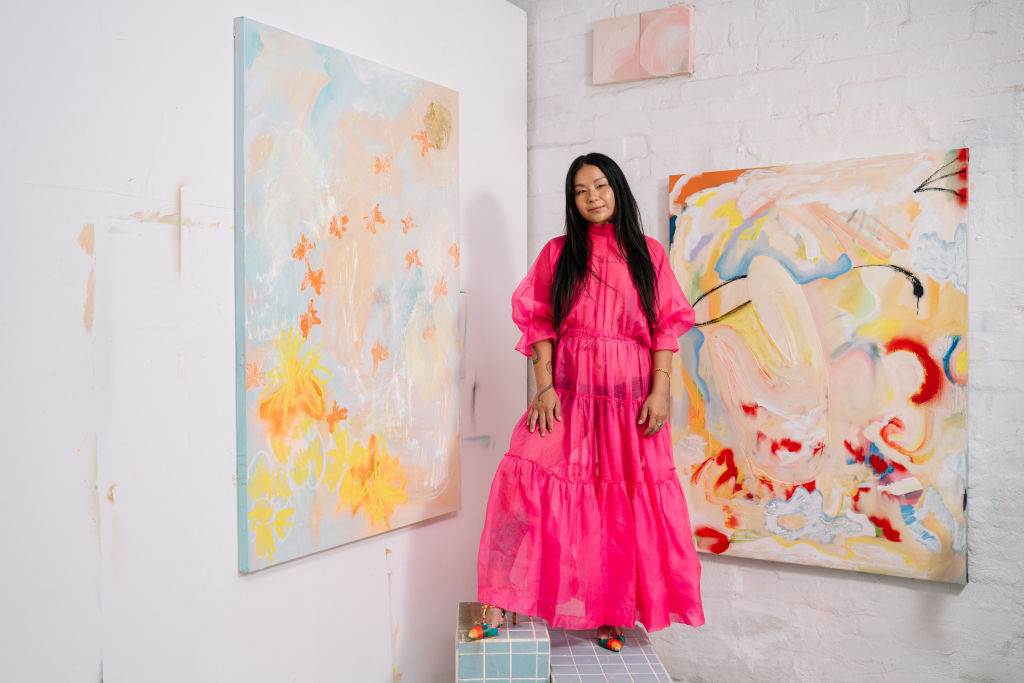
“Two weeks out I hadn’t painted anything because I was riddled with fear,” she says, “and then I remember one morning there was Mum’s voice, saying, ‘Marisa, today’s the day you try.’ I was like, ‘Okay. Mum says to do it.’ I still had her paints and I laid them out in the backyard – a beautiful day like today, blues skies – and I just started painting these liberated, naked woman dancing. I was crying and laughing at the same time.”
Within two weeks, Mu sold all these paintings. Within a year, she was a full-time artist, and in 2020 moved from Sydney to Melbourne.
“I honestly believe it was the best decision I’ve ever made. I’m born and bred Sydney, but I never really found my community. Melbourne seemed to care about what I had to say.”
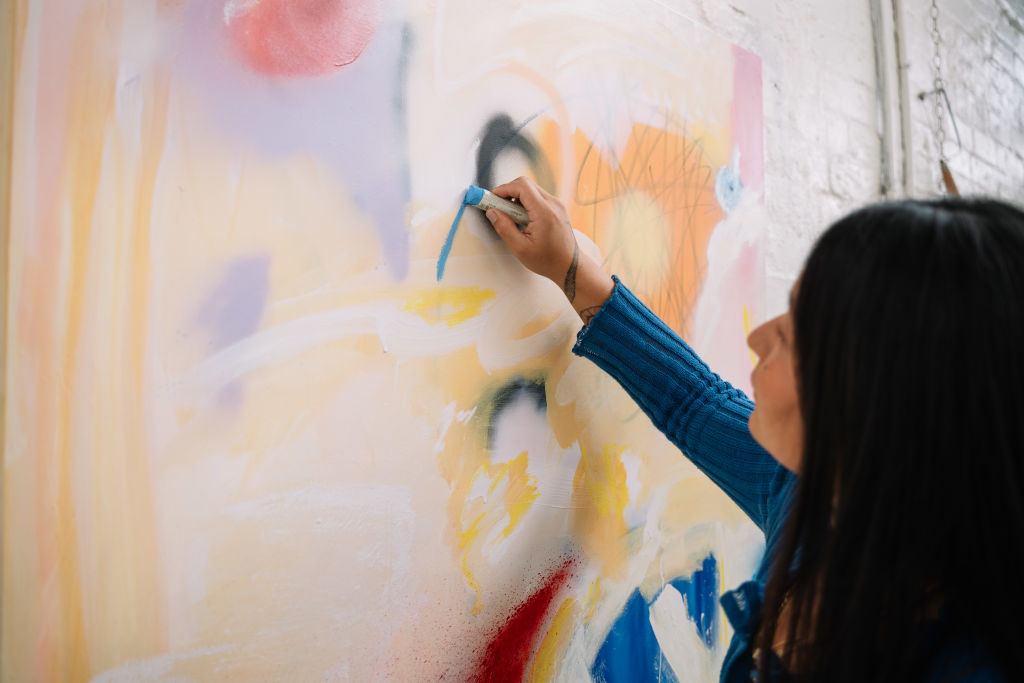
When it comes to navigating the art world, Mu knows that creating community is paramount to success and personal development. “I’m not scared to talk to people! I think that came from my years of working retail. There are a lot of community-oriented things that happen in Melbourne, which deeply aligns with me. I would meet so many beautiful people with similar mission statements about platforming for marginalised peoples.”
Mu’s home is filled with works from local artists, including Ami Morris, Jaime Brohier (aka House Arrest) and Poppy Templeton (Duck Ragu). Her followers can have a peek at its aqua walls, chequerboard rug, mid-century furniture and loopily large pot plants on Instagram. “We call it ‘The House of Peaches’ because we’re three queer angels who are creative and we all realised that if we could be any character in the world, we’d all be Princess Peach from Mario Kart,” she laughs.
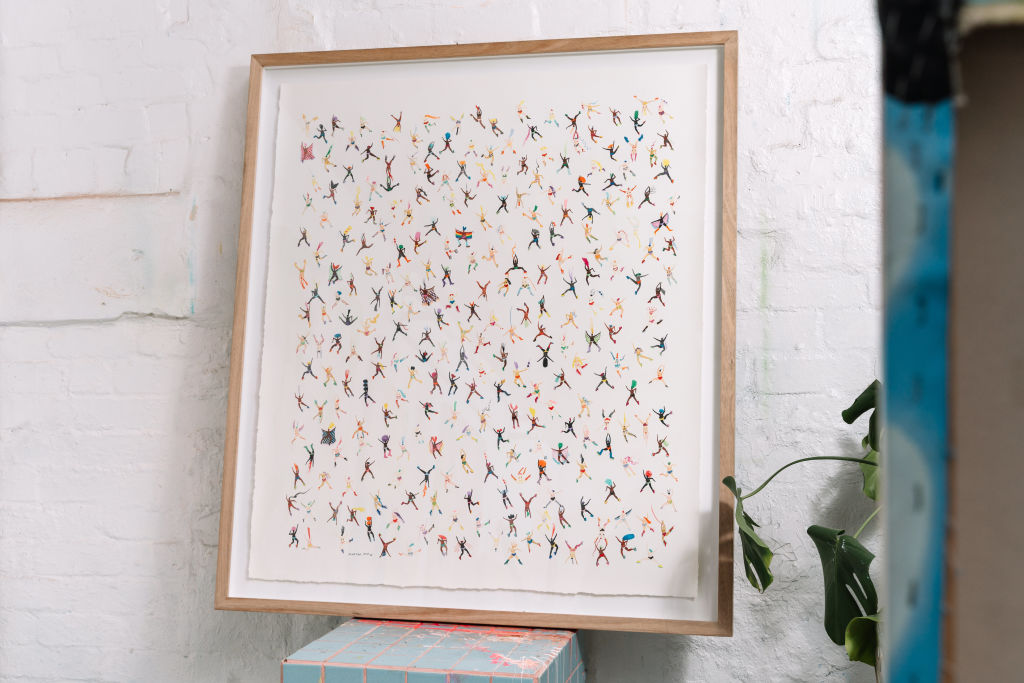
In 2019, Mu co-founded Tits & Co with artist Manuela Perez. It’s a community dedicated to intersectional artists – mostly online, though they showcased works at the 2023 Affordable Art Fair.
“Maybe it’s my upbringing, but I think we deserve a seat at this table. And I guess if other people don’t think that, I’m gonna make my own table,” Mu says.
While Mu continues to advocate for female and gender-non-conforming people, they won’t be found so prominently in her works anymore. The Femme Figures are on hiatus, making way for bold abstracts that are intensely personal.
This is a style Mu trialled back in 2021 when she was artist-in-residence at Fitzroy’s At the Above space. Things did not go to plan.
“I walked in thinking I’m going to explore the beauty of self-love, so I called it To Be Alone and Naked, because I’m an exhibitionist,” Mu says, laughing at her unknockable audacity. But not long into the residency, negative self-talk stymied her: Do you even know what you’re doing?
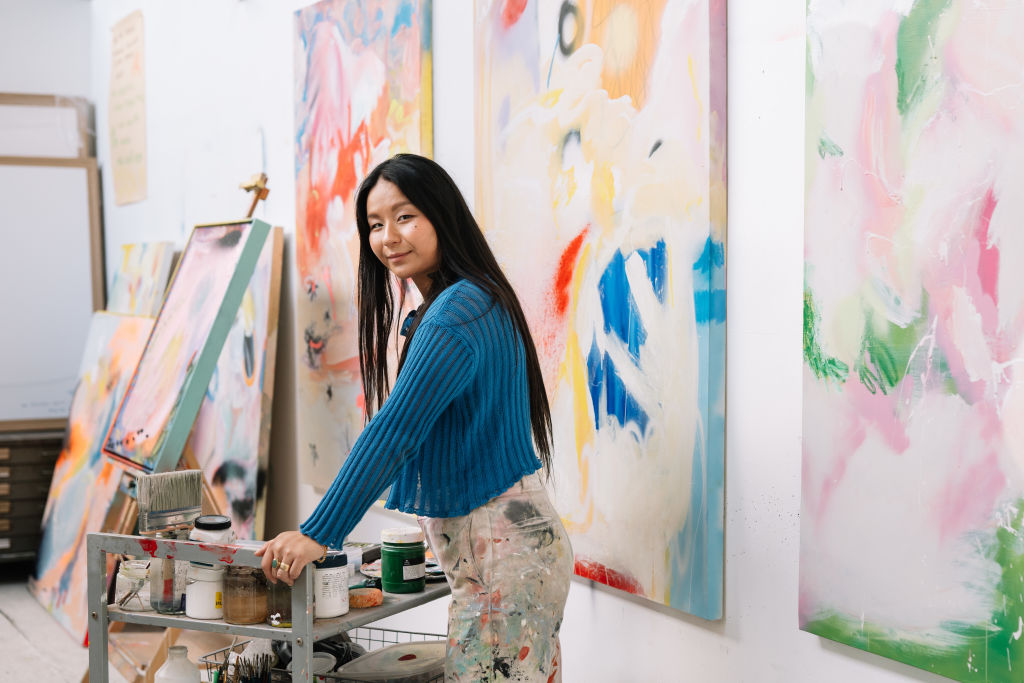
The pressure of changing styles suddenly felt like a huge risk. The Femme Figures had been good to her. They’d been rendered on wallpaper, shirts, ceramic vessels. They’d landed her shows in New York and LA.
“A lot of times when you find commercial success with a particular style, you fall into the trap of becoming like a machine,” the artist says. “I had so much more that I would like to say.”
To cement this epiphany, a butterfly made an appearance. Mu had left the gallery to go for a walk and get out of her own head. “I laughed because it was serendipitous. I realised, ‘Marisa, you’ve got the power.’ I ran back and started painting. It made me realise I had everything in me already to do what I needed to do, and I just had to back myself.”
Mu’s abstracts – explosions of colour, energy and rhythm – all sold out in pre-release. She donated a quarter of the sales to Sisterworks – which upskills migrant, refugee and asylum-seeker women – in honour of her mother. Now she’s returning to At the Above on March 15 for a solo show, With Pleasure. Once again, Mu is presenting large abstract works through which she navigates the intersection between her pansexuality and her cultural heritage.
“My ancestral lineage is Hakka Chinese; they’re nomads within China,” she says. “To be resilient is in my blood. I think about my lived experience of growing up in Australia, navigating this void about my past. All the women that walked before me were dealt so much hardship, but here I am, breathing and living.”
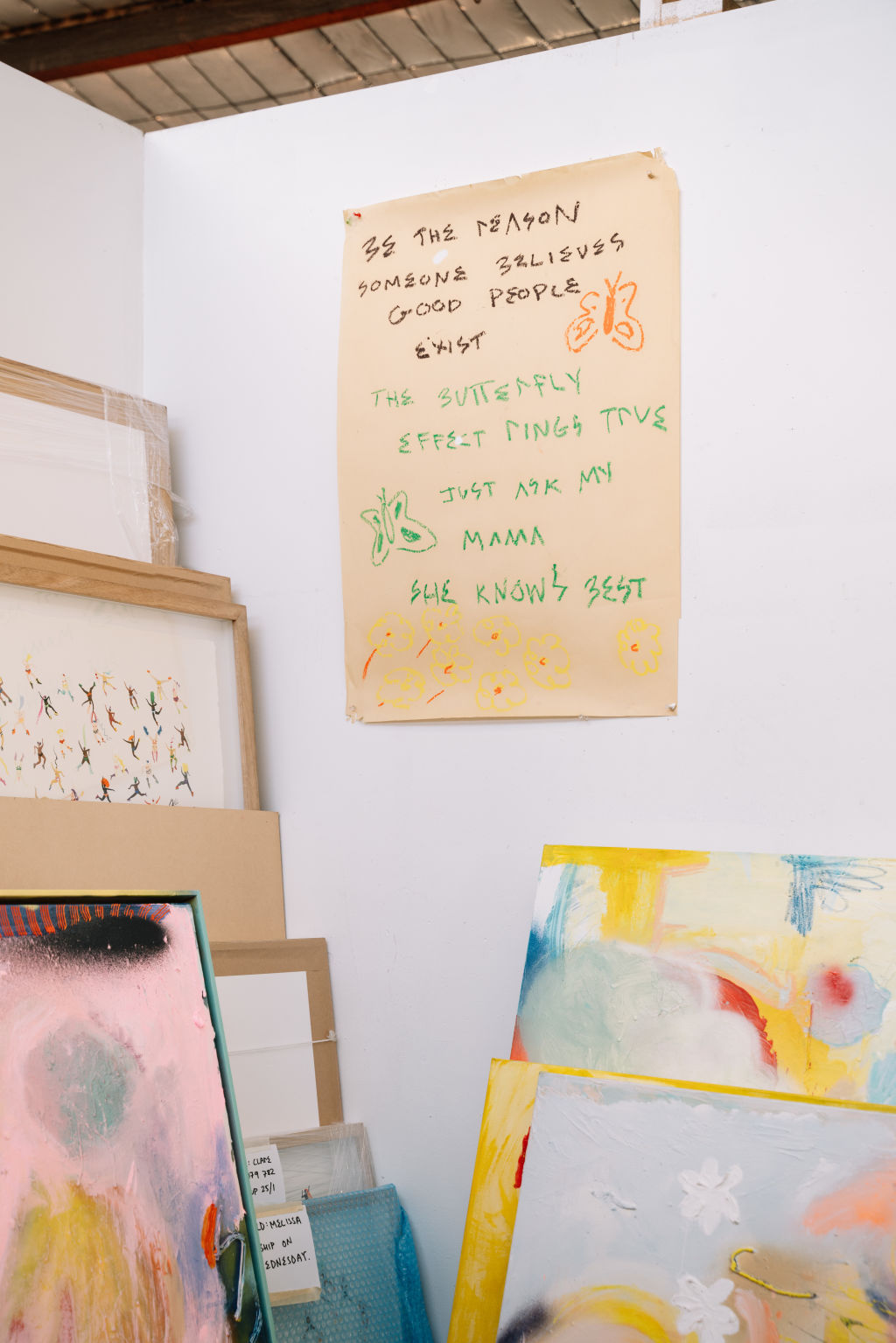
Also on show will be Lucky 13, a series of found objects and mixed media. “It’s the 13th anniversary of my mum’s death,” Mu explains. “In Chinese culture, we’re into numerology. I’m going to reclaim this number and make it lucky for me. I’m making talismans that pay homage to our relationship, like casting a bitter melon in resin to make it look like jade, because we would eat those a lot and they are precious to me.”
It’s the first anniversary that Mu has felt peace – both with the death of her mother and with her right to exist in the art world.
“People don’t realise the conflict that a lot of creatives undergo,” she says. “No one’s questioning what brushstrokes you should put next, but I never want people to question that I’m being authentic to myself. I am being brave by being an artist. That’s it. Full stop.”
This article first appeared in Domain Review, in partnership with Broadsheet.
We recommend
We thought you might like
States
Capital Cities
Capital Cities - Rentals
Popular Areas
Allhomes
More
